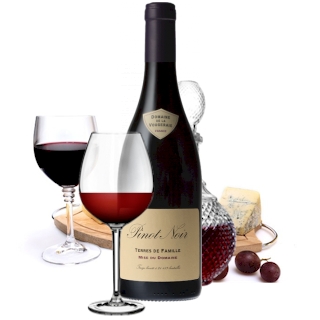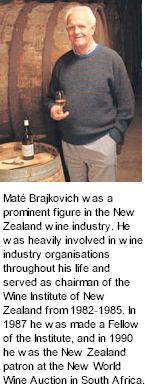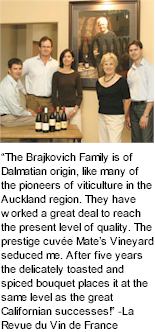


The family migrated from Yugoslavia in 1938 and had been working in the far Northern part of New Zealand digging kauri gum. After moving to Henderson, in West Auckland, in the early 1940s, they worked on vineyards and orchards in the area and saved enough money to buy a property with a small existing vineyard at Kumeu. Mick Brajkovich died in 1949, but Mat and Kat continued to tend the vines, make the wine and build the reputation of this fledgling wine company that became known as San Marino Vineyards. In 1958 Mat married Melba Sutich from Dargaville, whose antecedents also came from the Dalmatian coast.

Melba gave up a school-teaching career to become Mat's working partner. Their four children were born during the 1960s. From a very early age Michael, Marijana, Milan and Paul all became involved in the family business, helping their parents with odd-jobs in the vineyard and the winery, and also assisting to sell the wine at the winery cellar-door. The 1980s brought great changes and a move towards high quality table wines made from varieties such as Chardonnay, Sauvignon, Pinot Noir and Merlot which were produced from newly developed vineyards in Kumeu.
Maté Brajkovich became a prominent figure in the New Zealand wine industry. He was heavily involved in wine industry organisations throughout his life and served as chairman of the Wine Institute of New Zealand from 1982-1985. In 1987 he was made a Fellow of the Institute, and in 1990 he was the New Zealand patron at the New World Wine Auction held in South Africa.
At the Kumeu River Estate, the winemaking philosophy is simple. The team endeavours to grow grapes of the highest standard and then treat them with respect painstakingly turning quality fruit into outstanding wine. The quality is maximised to the fullest extent, delivering wines that are truly representative of the land. The vineyards are trained on the Lyre trellis to optimise their exposure to light and therefore, the ripeness of the grapes. Yields are kept low to improve the concentration of aromas and flavours in the grapes, the harvest is all done by hand. Faulty berries are removed in the field, and the quality grapes arrive at the winery in pristine condition.

The white grapes are all whole bunch pressed, which is time consuming but ensures the best quality result. The reds are destemmed and crushed gently before being transferred to fermentation tanks. No yeasts are added, the indigenous yeasts that are present in the vineyard are completely adequate to conduct fermentations. The white varietals, Chardonnay and Sauvignon Blanc undergo fermentation in barrels, and the flavour nuances that are derived from this phase are crucial to these fine wine styles. The red wines such as Merlot and Pinot Noir are fermented for a prolonged period in tanks, matured in oak barrels to promote the development of bouquet and to soften the tannin structure on the palate.
Oak barrels from France play a significant, but never dominant, role in the Kumeu River range of wines. These are wines of great flavour intensity and complexity, but also with subtlety and elegance, and the potential to develop with further age. Careful bacterial transformation reduces and softens the acidity, and rounds out the complexity of flavour. The result is a much better acid balance and improved drinkability.
After studying Oenology at Roseworthy College in South Australia where he was Dux in 1981, Michael Brajkovich returned to the family operations in Kumeu to take up responsibility for wine production. Since then he has travelled extensively through the world's wine areas and had the opportunity to spend the 1983 vintage in France with the reputed house of Jean Pierre Moueix in Libourne, near Bordeaux. In 1989, Michael passed the Examination and became New Zealand's first member of the prestigious Institute of Masters of Wine, London. He has many years experience in judging at the New Zealand National Wine Awards, and also has judged at the Australian National Capital Wine Show in Canberra, the Royal Hobart Wine Show in Tasmania and at the Perth Royal Wine Show.
Good winemaking is as much an art as a science. At Kumeu River Wines, great importance is placed on both of these factors. Without sound scientific knowledge, winemaking becomes haphazard and risky. Without art, the wines may be technically sound, but often dull and boring to drink. The Brajkovich Family is committed to ensuring that all of estate wines are not only properly and correctly produced, but also possess good characters of aroma and flavour, that ensure a heightened level of drinking pleasure.
